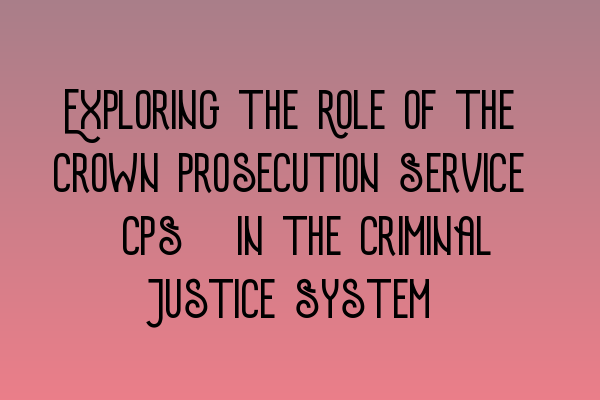Exploring the Role of the Crown Prosecution Service (CPS) in the Criminal Justice System
The criminal justice system in the United Kingdom is a complex and intricate network of institutions and processes that work together to uphold the law and maintain public order. One crucial component of this system is the Crown Prosecution Service (CPS), which plays a pivotal role in ensuring that criminal cases are prosecuted and justice is served.
As a solicitor specializing in criminal law and practice at SQE Criminal Law & Practice Law UK, I often encounter questions about the CPS and its function within the broader criminal justice system. In this blog post, I will shed light on the vital role of the CPS, its responsibilities, and its impact on the overall efficiency of the criminal justice system.
What is the Crown Prosecution Service (CPS)?
The Crown Prosecution Service (CPS) is an independent government agency responsible for prosecuting criminal cases in England and Wales. It operates under the direction of the Director of Public Prosecutions (DPP) and is dedicated to protecting the public interest by bringing wrongdoers to justice.
The CPS works closely with the police, who bring cases to the CPS’s attention for prosecution. It evaluates the evidence provided by the police and decides whether to proceed with a criminal case in court. The CPS also advises the police on legal issues and guides them on matters like evidence gathering to ensure a strong and compelling case.
The Responsibilities of the CPS
The CPS performs a wide range of responsibilities to ensure that criminal cases are dealt with fairly, efficiently, and in adherence to the law. Some of its primary duties include:
- Evaluating Evidence: The CPS carefully assesses the evidence provided by the police to determine the viability of prosecuting a case. This involves examining witness statements, forensic reports, and other documentation to establish whether there is a realistic prospect of conviction.
- Making Charging Decisions: Based on the evaluation of evidence, the CPS decides whether to charge an individual with a criminal offense. This decision takes into account factors such as the strength of the evidence, the public interest, and any relevant legal considerations.
- Preparing Cases: When a decision to charge is made, the CPS prepares the case for court proceedings. This involves instructing barristers and solicitors, arranging witness statements, organizing legal documentation, and ensuring all necessary evidence is presented to support the prosecution.
- Presenting Cases in Court: The CPS represents the prosecution in court, presenting the evidence and arguments against the defendant. Its role is to convince the court or jury of the defendant’s guilt beyond a reasonable doubt.
- Reviewing Convictions and Appeals: The CPS not only focuses on prosecuting new cases but also reviews convictions and appeals against them. In cases where new evidence emerges or there are concerns about the integrity of the conviction, the CPS plays a vital role in reassessing the case and determining if a new trial is required.
The Importance of the CPS in the Criminal Justice System
The role of the CPS extends far beyond simply prosecuting criminal cases. It is a crucial pillar of the criminal justice system, contributing to its efficiency, fairness, and transparency.
Firstly, the CPS ensures that criminal cases are dealt with promptly and effectively. By evaluating evidence and making charging decisions, the CPS streamlines the process of bringing cases to court, sparing unnecessary delays and ensuring that justice is served in a timely manner. This is essential for maintaining public trust and confidence in the criminal justice system.
Secondly, the CPS plays a paramount role in upholding the principle of fairness in criminal proceedings. Its duty to act independently and objectively ensures that decisions to prosecute are based solely on the evidence and the public interest. By providing legal guidance to the police and ensuring the prosecution’s case is robust, the CPS strives to ensure that defendants receive a fair trial.
Furthermore, the CPS helps to maintain transparency and accountability within the criminal justice system. As a prosecuting authority, it is subject to scrutiny and review. The CPS’s commitment to reviewing convictions and appeals demonstrates its dedication to rectifying any errors or injustices that may have occurred.
In conclusion, understanding the role of the Crown Prosecution Service (CPS) is essential for comprehending the broader workings of the criminal justice system in the UK. The CPS acts as a guardian of justice, ensuring that criminal cases are prosecuted fairly, efficiently, and in the public interest. Its responsibilities encompass the evaluation of evidence, charging decisions, case preparation, courtroom representation, and review of convictions. By carrying out these responsibilities, the CPS contributes to the effective functioning, fairness, and transparency of the criminal justice system as a whole.
If you are interested in further exploring the subject or looking for more resources related to SQE Criminal Law & Practice Law UK, you may find the following articles helpful:
